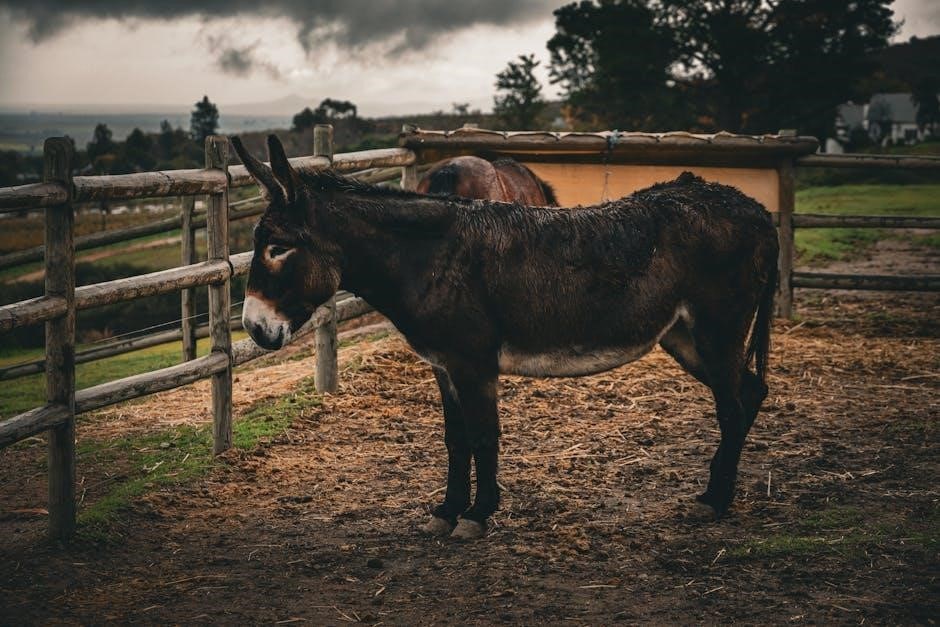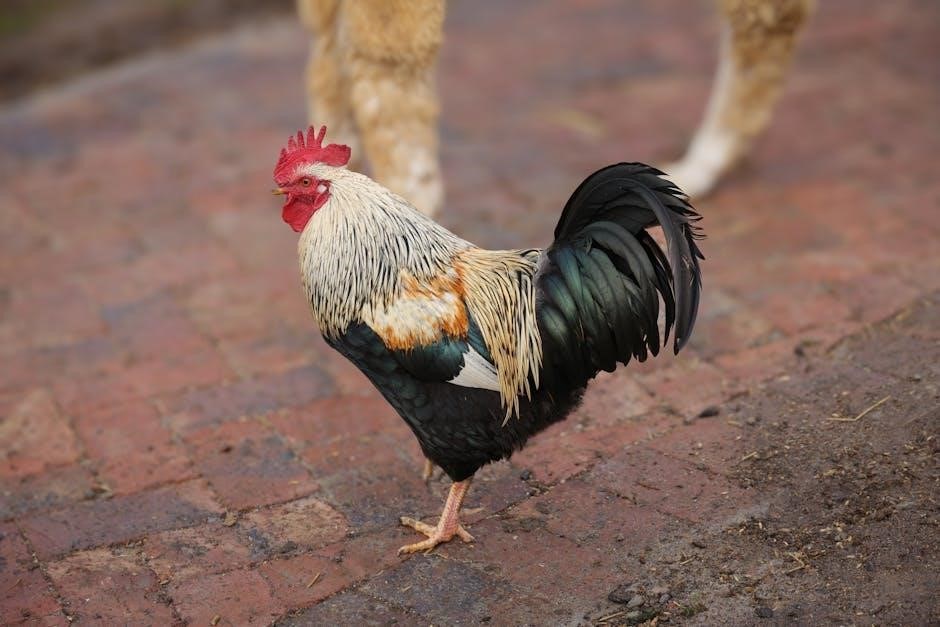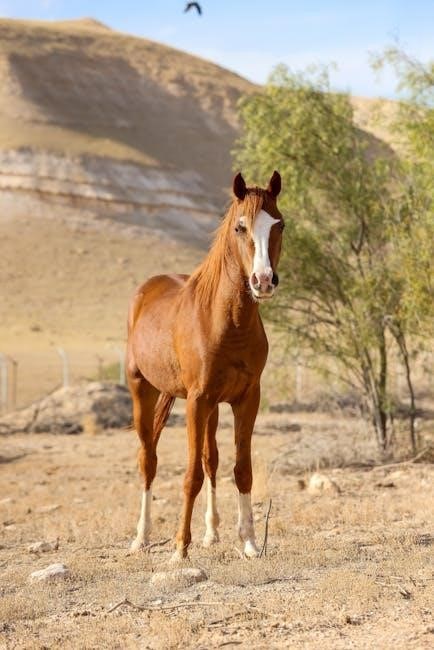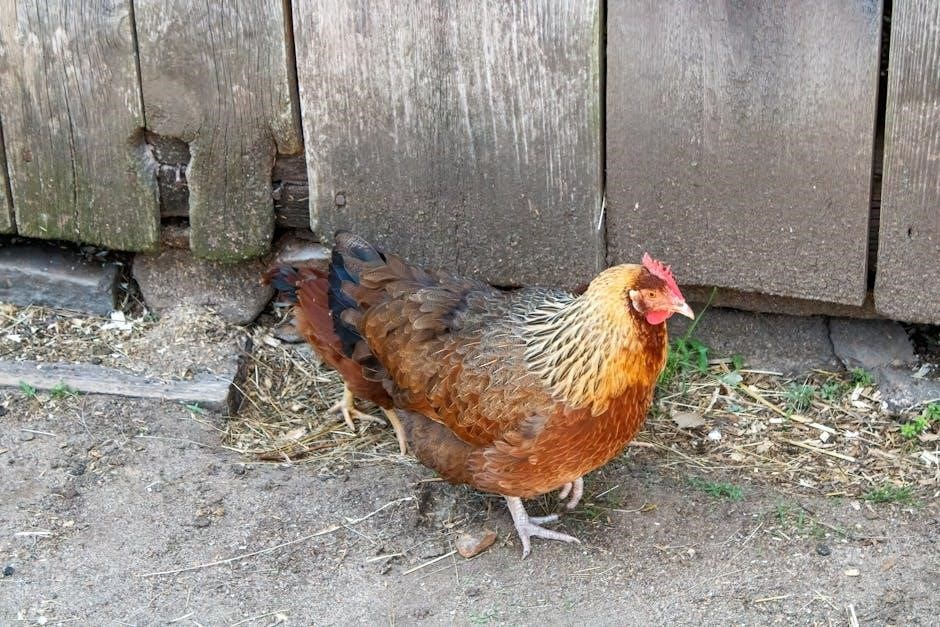This section provides an overview of the study guide, offering insights into George Orwell’s timeless novel. It includes chapter summaries, thematic analysis, and critical questions to enhance understanding and spark discussion.
1.1 Overview of the Study Guide
This section outlines the structure and content of the Animal Farm study guide, including chapter summaries, key events, and thematic analysis. It provides study questions and answers, enabling a deeper understanding of Orwell’s novel. The guide is designed to assist readers in exploring the themes, characters, and historical context, making it an essential resource for students and educators alike.
1.2 Importance of the Study Guide for Understanding the Novel
The study guide is essential for grasping the depth of Animal Farm, offering a comprehensive analysis of themes, characters, and historical context. It provides structured questions and answers, enabling readers to interpret complex ideas and explore Orwell’s intent. This resource is invaluable for students and educators, fostering a deeper engagement with the novel’s timeless themes and moral lessons.
Major Themes in Animal Farm
Animal Farm explores themes of totalitarianism, corruption of power, and betrayal of ideals. These themes highlight the dangers of unchecked authority and the erosion of democratic values.
2.1 The Theme of Totalitarianism
Animal Farm vividly portrays totalitarianism through Napoleon’s rise to power. The manipulation of the Seven Commandments and the suppression of dissent mirror the tactics of authoritarian regimes, illustrating the dangers of absolute control and the loss of individual freedom. Orwell’s depiction serves as a cautionary tale about the corruption inherent in unchecked power structures.
2.2 The Betrayal of Ideals and Corruption of Power
The novel explores how the pigs, led by Napoleon, gradually betray the original ideals of the rebellion. The corruption of power is evident as they exploit their authority, altering the Seven Commandments to justify their selfish actions. This betrayal reflects the moral decay and abuse of trust, undermining the farm’s unity and the principles of equality and justice.
Character Analysis in Animal Farm
This section delves into the personalities and roles of key characters, exploring their motivations and development. It examines how Napoleon, Snowball, and Boxer represent human traits and ideologies, highlighting their struggles and transformations within the story’s political allegory.
3.1 Main Characters: Napoleon, Snowball, and Boxer
Napoleon, the cunning pig, embodies power and manipulation, while Snowball represents idealism and intellectual leadership. Boxer, the dedicated horse, symbolizes loyalty and hard work, highlighting their distinct roles in the story’s dynamics and themes of power, betrayal, and resilience.
3.2 Secondary Characters: Squealer, Old Major, and Benjamin
Squealer, the manipulative propagandist, twists facts to justify Napoleon’s actions. Old Major, the wise boar, inspires rebellion with his vision of a better future. Benjamin, the intelligent donkey, remains skeptical and observant, offering a voice of reason amidst the chaos, each contributing uniquely to the story’s depth and thematic exploration.
3.3 Symbolic Characters and Their Roles
In Animal Farm, symbolic characters like the pigs, representing political figures, and Boxer, embodying the exploited working class, illustrate Orwell’s critique of totalitarianism. The sheep symbolize mindless followers, while Squealer, the propagandist, manipulates truth. Benjamin, the skeptical donkey, represents the intelligentsia, highlighting themes of corruption and the dangers of unchecked power through their roles and interactions.
Symbolism in Animal Farm
The farm symbolizes the Soviet Union, while the barn represents the repository of history and knowledge. The pigs embody corrupt leadership, exploring themes of power, manipulation, and betrayal.
4.1 The Symbolism of the Farm Itself
The farm symbolizes society, reflecting the rise and fall of utopian ideals. It transitions from a place of hope to one of corruption, mirroring historical revolutions. The pigs’ manipulation of power transforms the farm, highlighting themes of control and betrayal, as the farm’s name change from Manor Farm to Animal Farm signifies the shift from oppression to false liberation.
4.2 The Barn as a Symbol of Knowledge and History
The barn represents the heart of the animals’ intellectual and historical identity. It houses the Seven Commandments, symbolizing shared ideals and unity. Meetings and decisions occur here, making it a hub of collective knowledge. The barn’s transformation over time reflects the corruption of original principles, as the pigs alter the commandments, erasing the animals’ historical memory and ideals.
4.3 Animal Representations of Human Figures
In Animal Farm, animals symbolize key human figures from the Russian Revolution. Napoleon mirrors Stalin, embodying authoritarianism, while Snowball represents Trotsky, advocating for idealistic change. Boxer, with his relentless work ethic, symbolizes the exploited working class. These representations allow Orwell to critique historical events through allegory, making the novel a powerful commentary on human nature and political ideologies.

Chapter Summaries and Key Events
This section provides concise summaries of each chapter, highlighting major events and turning points in the novel. It helps students track the plot progression and understand key moments that shape the story’s themes and character development.
Chapter 1 introduces Mr. Jones’ neglected Manor Farm, where the animals suffer under poor conditions. Old Major, a wise boar, calls a meeting to share his vision of a rebellion against humans, inspiring the animals with his speech about a utopian future without oppression. This sets the stage for the upcoming revolt.
5.2 Summary of Chapter 2: The Rebellion
Chapter 2 recounts the animals’ spontaneous rebellion, driven by their suffering under Mr. Jones. United, they expel him from the farm, renaming it “Animal Farm.” The pigs, led by Napoleon and Snowball, assume leadership, sparking hope for a better future. The chapter highlights the animals’ initial unity and the birth of their revolutionary ideals.
5.3 Summary of Chapter 3: The Formation of the Seven Commandments
In Chapter 3, the pigs, led by Napoleon and Snowball, create the Seven Commandments, which are painted on the barn. These principles, designed to prevent tyranny and exploitation, emphasize equality and fairness. The commandments serve as the foundation for Animal Farm’s governance, symbolizing the animals’ shared ideals and commitment to their revolutionary cause.
Study Questions and Answers
This section provides chapter-specific questions, thematic inquiries, and essay topics to deepen understanding of Orwell’s themes, characters, and plot developments in Animal Farm.
6.1 Chapter-Specific Questions
This section offers detailed questions for each chapter of Animal Farm, prompting readers to reflect on key events, themes, and character motivations. Questions encourage analysis of power dynamics, ideological shifts, and symbolic elements, while also exploring Orwell’s critique of totalitarianism. These inquiries help deepen understanding of the novel’s layered meanings and its timeless relevance to political and social issues.
6.2 Thematic Questions and Their Answers
This section explores the novel’s central themes, such as totalitarianism, the betrayal of ideals, and the corrupting influence of power. Questions and answers delve into how these themes are developed through character actions and events. Orwell’s critique of authoritarianism and the erosion of truth are highlighted, offering a deeper understanding of the novel’s political and moral commentary.
6.3 Essay Topics and Discussion Points
This section provides thought-provoking essay topics, such as analyzing the theme of power corruption or the rise of totalitarianism. Discussion points encourage exploration of Orwell’s critique of authoritarianism and its relevance today. Topics also include the betrayal of ideals and the impact of propaganda, fostering deeper critical thinking and analysis of the novel’s timeless themes.

Historical Context of Animal Farm
Explore how George Orwell drew inspiration from the Russian Revolution and Stalinism, reflecting on totalitarianism and political corruption in this timeless critique of authoritarian regimes.
7.1 The Russian Revolution and Its Influence
George Orwell’s Animal Farm mirrors the Russian Revolution, with the animal rebellion symbolizing the Bolshevik uprising. The novel reflects the rise of Stalinism, as Napoleon embodies totalitarian leadership. The corruption of power and betrayal of ideals parallel the Soviet regime’s decline. Orwell critiques the distortion of revolutionary principles, offering a cautionary tale about authoritarianism and its consequences.
7.2 Stalinism and the Rise of Totalitarianism
Stalinism’s rise mirrors the totalitarian regime in Animal Farm, where Napoleon’s leadership embodies authoritarian control. Propaganda, manipulated truths, and fear tactics maintain power, reflecting Stalin’s methods. The novel critiques the erosion of revolutionary ideals, as the pigs’ corruption parallels Stalin’s regime, highlighting Orwell’s warning against absolute power and its corrupting influence on societies and revolutions.

Literary Devices in Animal Farm
Orwell employs allegory, satire, and irony to critique totalitarianism. The novel’s symbolic characters and events mirror historical realities, making it a powerful commentary on political corruption and manipulation.
8.1 Allegory and Satire
Orwell masterfully uses allegory to mirror historical events, such as the Russian Revolution, through the animals’ struggle. Satire is employed to critique totalitarianism, highlighting the corruption and manipulation of power. The novel’s allegorical nature allows readers to draw parallels between the story and real-world political movements, making it a timeless commentary on human nature and governance.
8.2 Irony and Symbolism
Orwell employs irony to highlight the hypocrisy within the farm’s leadership, as the pigs’ actions contradict their initial ideals. Symbolism is prevalent, with the barn representing history and collective memory. The study guide explores how these literary devices deepen the novel’s critique of power and corruption, offering readers a richer understanding of Orwell’s layered narrative.

The Author’s Intent and Message
Orwell’s intent was to critique totalitarianism and the corruption of power. His message warns against tyranny and the erosion of freedom, remaining universally relevant today.
9.1 George Orwell’s Political Views
George Orwell was a vocal critic of totalitarianism and authoritarianism, advocating for democratic socialism. His work reflects a deep distrust of oppressive regimes and the manipulation of power, as seen in Animal Farm. Orwell’s political views were shaped by his experiences with fascism and communism, influencing his warnings against government control and the erosion of individual freedoms.
9.2 The Warning Against Tyranny
Orwell’s Animal Farm serves as a cautionary tale about the dangers of tyranny and the corrupting influence of power. Through the pigs’ rise to dominance, Orwell illustrates how authoritarian regimes manipulate truth and exploit fear to maintain control. The novel underscores the importance of vigilance and the preservation of individual freedoms in the face of oppressive systems.

The Significance of Animal Farm Today
Animal Farm remains a powerful allegory, offering timeless lessons on power, corruption, and freedom. Its themes resonate in modern discussions on politics, leadership, and societal structures.
10.1 Relevance in Modern Political Discourse
Orwell’s Animal Farm remains a potent allegory in today’s political climate, offering insights into power dynamics, corruption, and the erosion of freedom. The novel’s themes resonate in discussions about authoritarianism, propaganda, and the manipulation of truth, making it a valuable tool for understanding contemporary political issues and leadership structures worldwide.
10.2 Universal Themes and Timeless Lessons
Animal Farm explores universal themes such as the dangers of unchecked power, the corrupting influence of authority, and the loss of freedom. Its lessons about manipulation, propaganda, and the erosion of ideals remain timeless, offering readers a cautionary tale about the consequences of complacency and the importance of critical thinking in preserving democracy and justice.

Educational Value of the Study Guide
The study guide enhances comprehension of Animal Farm, offering structured questions and answers to analyze themes, characters, and chapters, fostering deeper understanding and critical engagement with the novel.
11.1 Enhancing Understanding of the Novel
The study guide provides structured questions and answers, chapter summaries, and thematic analysis, helping students engage deeply with Animal Farm. It fosters critical thinking by exploring complex themes like totalitarianism and betrayal, while its clear structure ensures a comprehensive understanding of Orwell’s allegorical narrative, making it an invaluable resource for educational purposes.
11;2 Developing Critical Thinking Skills
The study guide’s chapter-specific questions and thematic analysis encourage students to evaluate complex themes and moral dilemmas. By exploring Orwell’s allegorical narrative, readers develop the ability to analyze, interpret, and form well-supported arguments, fostering a deeper understanding of the novel and enhancing their critical thinking abilities through structured inquiry and reflection.
The Animal Farm study guide provides a comprehensive exploration of Orwell’s novel, offering insights and questions to deepen understanding. Thank you for exploring this resource!
12.1 Recap of Key Points
The study guide thoroughly explores Animal Farm, covering themes like totalitarianism and corruption, character analyses, and symbolic elements. It provides chapter summaries and critical questions to foster deep understanding and discussion, along with resources for further study, including PDF downloads and online access to enhance learning and engagement with Orwell’s timeless novel.
12.2 Final Thoughts on the Study Guide
The study guide effectively enhances understanding of Animal Farm, offering comprehensive insights and critical questions. It serves as a valuable resource for students and readers, fostering deeper engagement with Orwell’s themes and characters. The inclusion of PDF downloads and online access further enriches the learning experience, ensuring a thorough exploration of the novel’s timeless lessons and relevance.